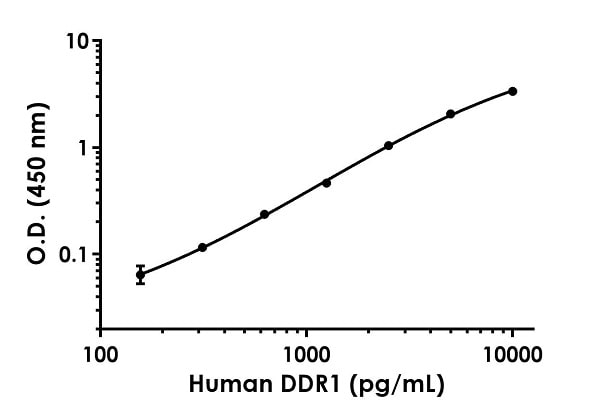Human DDR1 ELISA Kit (ab260063)
Key features and details
- One-wash 90 minute protocol
- Sensitivity: 20.53 pg/ml
- Range: 156.25 pg/ml - 10000 pg/ml
- Sample type: Cell culture supernatant
- Detection method: Colorimetric
- Assay type: Sandwich (quantitative)
- Reacts with: Human
Overview
-
Product name
Human DDR1 ELISA Kit
See all MCK10/NEP kits -
Detection method
Colorimetric -
Precision
Intra-assay Sample n Mean SD CV% Supernatant 8 1.68% -
Sample type
Cell culture supernatant -
Assay type
Sandwich (quantitative) -
Sensitivity
20.53 pg/ml -
Range
156.25 pg/ml - 10000 pg/ml -
Recovery
Sample specific recovery Sample type Average % Range Cell culture supernatant 89 % - % -
Assay time
1h 30m -
Assay duration
One step assay -
Species reactivity
Reacts with: Human -
Product overview
Human DDR1 ELISA Kit (ab260063) is a single-wash 90 min sandwich ELISA designed for the quantitative measurement of DDR1 protein in cell culture supernatant. It uses our proprietary SimpleStep ELISA® technology. Quantitate Human DDR1 with 20.53 pg/ml sensitivity.
SimpleStep ELISA® technology employs capture antibodies conjugated to an affinity tag that is recognized by the monoclonal antibody used to coat our SimpleStep ELISA® plates. This approach to sandwich ELISA allows the formation of the antibody-analyte sandwich complex in a single step, significantly reducing assay time. See the SimpleStep ELISA® protocol summary in the image section for further details. Our SimpleStep ELISA® technology provides several benefits:
- Single-wash protocol reduces assay time to 90 minutes or less
- High sensitivity, specificity and reproducibility from superior antibodies
- Fully validated in biological samples
- 96-wells plate breakable into 12 x 8 wells stripsA 384-well SimpleStep ELISA® microplate (ab203359) is available to use as an alternative to the 96-well microplate provided with SimpleStep ELISA® kits.
-
Notes
Epithelial discoidin domain-containing receptor 1 (DDR1) is a tyrosine kinase receptor involved in cell attachment to the extracellular matrix. DDR1 is also involved in cell proliferation and differentiation. DDR1’s contribution to remodeling of the extracellular matrix supports cell migration and wound healing.
-
Platform
Pre-coated microplate (12 x 8 well strips)
Properties
-
Storage instructions
Store at +4°C. Please refer to protocols. -
Components 1 x 96 tests 10X Human DDR1 Capture Antibody 1 x 600µl 10X Human DDR1 Detector Antibody 1 x 600µl 10X Wash Buffer PT (ab206977) 1 x 20ml Antibody Diluent CPI - HAMA Blocker (ab193969) 1 x 6ml Human DDR1 Lyophilized Recombinant Protein 2 vials Plate Seals 1 unit Sample Diluent NS (ab193972) 1 x 12ml SimpleStep Pre-Coated 96-Well Microplate (ab206978) 1 unit Stop Solution 1 x 12ml TMB Development Solution 1 x 12ml -
Research areas
-
Function
May be involved in cell-cell interactions and recognition. -
Tissue specificity
Detected in T-47D, MDA-MB-175 and HBL-100 breast carcinoma cells, A431 epidermoid carcinoma cells, SW48 and SNU-C2B colon carcinoma cells and Hs 294T melanoma cells (at protein level). Expressed at low levels in most adult tissues and is highest in the brain, lung, placenta and kidney. Lower levels of expression are detected in melanocytes, heart, liver, skeletal muscle and pancreas. Abundant in breast carcinoma cell lines. In the colonic mucosa, expressed in epithelia but not in the connective tissue of the lamina propria. In the thyroid gland, expressed in the epithelium of the thyroid follicles. In pancreas, expressed in the islets of Langerhans cells, but not in the surrounding epithelial cells of the exocrine pancreas. In kidney, expressed in the epithelia of the distal tubules. Not expressed in connective tissue, endothelial cells, adipose tissue, muscle cells or cells of hematopoietic origin. -
Sequence similarities
Belongs to the protein kinase superfamily. Tyr protein kinase family. Insulin receptor subfamily.
Contains 1 F5/8 type C domain.
Contains 1 protein kinase domain. -
Domain
The Gly/Pro-rich domains may be required for an unusual geometry of interaction with ligand or substrates. -
Cellular localization
Secreted and Membrane. - Information by UniProt
-
Alternative names
- CAK
- CD 167
- CD167
see all -
Database links
- Entrez Gene: 780 Human
- Omim: 600408 Human
- SwissProt: Q08345 Human
- Unigene: 631988 Human
Images
-
SimpleStep ELISA technology allows the formation of the antibody-antigen complex in one single step, reducing assay time to 90 minutes. Add samples or standards and antibody mix to wells all at once, incubate, wash, and add your final substrate. See protocol for a detailed step-by-step guide.
-
The DDR1 standard curve was prepared as described in Section 10. Raw data values are shown in the table. Background-subtracted data values (mean +/- SD) are graphed.
-
The concentrations of DDR1 were measured in duplicates, interpolated from the DDR1 standard curves and corrected for sample dilution. Undiluted samples are as follows: MCF7 supernatant 50%. The interpolated dilution factor corrected values are plotted (mean +/- SD, n=2). The mean DDR1 concentration was determined to 3,910.99 pg/mL in MCF7 supernatant.
-
To learn more about the advantages of recombinant antibodies see here.














